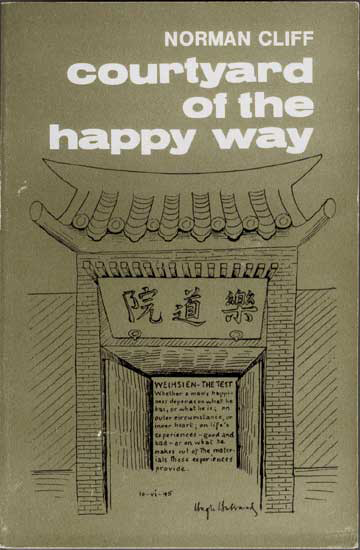
- by Norman Cliff
 The new arrivals had found the premises in very bad condition; after the missionaries and Chinese student body had left, the property had been looted by Chinese bandits, and then occupied by Japanese soldiers; afterwards vacated and left to deteriorate further. The roads were strewn with rubble, the toilets choked, and the remains of desks and tables lying around, having been broken up for firewood.
The new arrivals had found the premises in very bad condition; after the missionaries and Chinese student body had left, the property had been looted by Chinese bandits, and then occupied by Japanese soldiers; afterwards vacated and left to deteriorate further. The roads were strewn with rubble, the toilets choked, and the remains of desks and tables lying around, having been broken up for firewood.
These first internees had set to work with that resourcefulness and determination characteristic of the human race when looking for the basic comforts of life. They cleared roads, cleaned the rooms, opened up three big kitchens (Kitchen I for the Tientsin community, Kitchen II for those from Peking and Kitchen III for Tsingtao internees), each feeding five hundred people. Catholic priests from Belgium, Holland and America, mostly in their twenties, cleared the toilets and erected large ovens for the camp bakery.
A well-organised community was soon running its own affairs, each person with his or her own specific duties. At the top of the organisation chart was the Japanese commandant, and under him the camp representative. He was in turn chairman of a Council of Committee leaders, covering general affairs, discipline, labour, education, supplies, quarters, medicine, engineering and finance.
How fortunate we were in that by the time we arrived in this self-contained community all was running smoothly and efficiently. The administrative machinery was most impressive. The Quarters Leader allocated us dormitories, the Labour Leader gave us forms to fill in with crosses to put down to indicate how much experience we had had in teaching, engineering, cooking, baking and other spheres.
It was quite evident that the four hundred Catholic priests and nuns had made a great impact and profound impression on the internee community. They had turned their hands to the most menial tasks cheerfully and willingly, organised baseball games and helped in the educational programme for the young.
But inevitably romances had been formed between admiring Tientsin and Peking girls and celibate Belgian and American priests from the lonely wastes of Manchuria. Anxious Vatican officials had solved the delicate problem by careful negotiations with the Japanese, as a result of which all but thirty priests had been transferred to an institution of their own in Peking where they could meditate and say their rosaries without feminine distractions.
Their departure had left a vacuum in effective manpower for such tasks as pumping, cooking and baking. Thus the arrival of our Chefoo community aggravated the situation further, for out of the three hundred of us only about two dozen were potential camp workers, the remainder being schoolchildren and retired missionaries.
But for ourselves coming to Weihsien proved to be the opening up of a new world, after the cramped and monotonous life at Temple Hill. Here in Weihsien were well-informed scholars, missionaries of other traditions, business men with a variety of backgrounds. Adult education was provided in Chinese, Japanese, Russian; bookkeeping, shorthand and philosophy. There were concerts, pantomimes, plays, baseball matches and many other community activities.
Soon life in this new camp was running smoothly and we were feeling very much part of this new social environment. I was housed with other boys of the school in Block 23, an attractive building at the far end of the camp, superior to the small blocks of rooms in which the families were housed. The Labour Representative placed me in a kitchen shift of Kitchen I that fed some six hundred people.
[further reading] ...
http://www.weihsien-paintings.org/NormanCliff/Books/Courtyard/eDocPrintPro-BOOK-Courtyard-01-WEB-(pages).pdf
#








